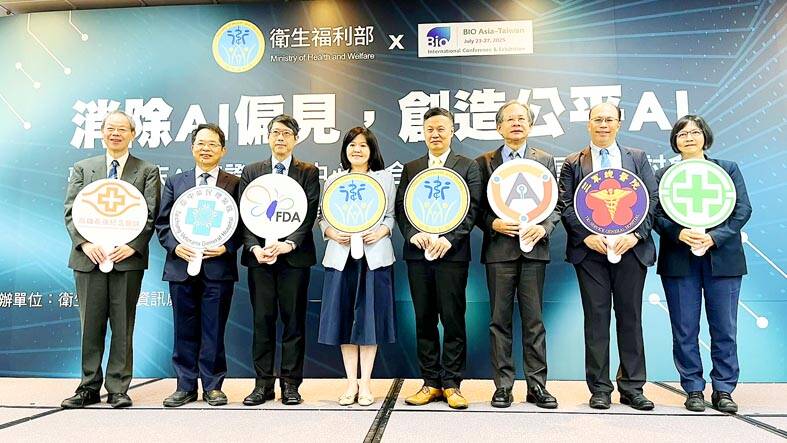The Ministry of Health and Welfare yesterday launched a clinical data verification and certification system in a boost to medical artificial intelligence (AI) research in Taiwan.
The nation needs to train medical algorithms on indigenous data that reflect conditions in Taiwan to avoid AI bias in “smart” medicine, Department of Information Management Director Lee Chien-chang (李建璋) said at the system’s launch event in Taipei.
Medical AI trained on data derived from one nation or region could be ineffective in another, because of demographic differences, he said.

Photo: Lin Hui-chin, Taipei Times
For example, a model for diagnosing diabetes-related retinal diseases recently adapted in Thailand was found to be nearly useless in practice, despite its high accuracy in laboratory conditions, he said.
The flaw of the system was in its dataset, which included only people with or without diabetes-related retinal disorders, Lee said.
Overrepresentation of privileged or well-researched demographic groups due to gaps in wealth or the urban-country divide could also compromise a model’s effectiveness, Lee said.
The department and the Food and Drug Administration jointly subsidized clinical data centers at Taichung Veterans’ General Hospital, Kaohsiung Chang Kung Memorial Hospital, Tri-Service General Hospital and Far Eastern Memorial Hospital, he said.
The centers feature an inter-hospital data comparison function and a federated learning model to meet Health Level Seven Inc’s Fast Healthcare Interoperability Resources standard, he said.
Using a federated learning model and a centralized verification and certification process allow developers to work without accessing physical documents, test a model’s effectiveness on data derived from multiple hospitals and ensure digital privacy, he said.
The system can depersonalize data and AI training suggestions to hasten the certification of models, Lee said.
Each branch of the AI datacenter has a specific mission, such as data security and privacy protection, certifying AI safety and fairness, and making recommendations for a model’s inclusion in the National Health Insurance system, he said.
Rigorous and standardized verification of clinical data integrity is crucial to the nation’s medical AI development, ministry Secretary-General Liu Yu-chuan (劉玉娟) said.

The manufacture of the remaining 28 M1A2T Abrams tanks Taiwan purchased from the US has recently been completed, and they are expected to be delivered within the next one to two months, a source said yesterday. The Ministry of National Defense is arranging cargo ships to transport the tanks to Taiwan as soon as possible, said the source, who is familiar with the matter. The estimated arrival time ranges from late this month to early next month, the source said. The 28 Abrams tanks make up the third and final batch of a total of 108 tanks, valued at about NT$40.5 billion

Two Taiwanese prosecutors were questioned by Chinese security personnel at their hotel during a trip to China’s Henan Province this month, the Mainland Affairs Council (MAC) said yesterday. The officers had personal information on the prosecutors, including “when they were assigned to their posts, their work locations and job titles,” MAC Deputy Minister and spokesman Liang Wen-chieh (梁文傑) said. On top of asking about their agencies and positions, the officers also questioned the prosecutors about the Cross-Strait Joint Crime-Fighting and Judicial Mutual Assistance Agreement, a pact that serves as the framework for Taiwan-China cooperation on combating crime and providing judicial assistance, Liang

A group from the Taiwanese Designers in Australia association yesterday represented Taiwan at the Midsumma Pride March in Melbourne. The march, held in the St. Kilda suburb, is the city’s largest LGBTQIA+ parade and the flagship event of the annual Midsumma Festival. It attracted more than 45,000 spectators who supported the 400 groups and 10,000 marchers that participated this year, the association said. Taiwanese Designers said they organized a team to march for Taiwan this year, joining politicians, government agencies, professionals and community organizations in showing support for LGBTQIA+ people and diverse communities. As the first country in Asia to legalize same-sex

MOTIVES QUESTIONED The PLA considers Xi’s policies toward Taiwan to be driven by personal considerations rather than military assessment, the Epoch Times reports Chinese President Xi Jinping’s (習近平) latest purge of the Chinese People’s Liberation Army (PLA) leadership might have been prompted by the military’s opposition to plans of invading Taiwan, the Epoch Times said. The Chinese military opposes waging war against Taiwan by a large consensus, putting it at odds with Xi’s vision, the Falun Gong-affiliated daily said in a report on Thursday, citing anonymous sources with insight into the PLA’s inner workings. The opposition is not the opinion of a few generals, but a widely shared view among the PLA cadre, the Epoch Times cited them as saying. “Chinese forces know full well that